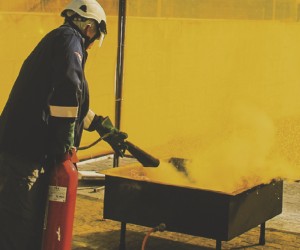Access Inspection Development (AID) South Africa is showcasing its training expertise in rope access skills, heavy lifting and rigging for rope access at November’s annual Windaba event. The company, formed by UK based Tjebbe Roestenburg in 2005, has recently acquired the Global Wind Organisation (GWO) accreditation to work with leading international suppliers such as Siemens, Nordex and Goldwind.
It is a timely initiative. Four years ago there were just 10 wind turbines in the country. The number now exceeds 500 and is increasing all the time, creating a clear opportunity for companies like AID South Africa to develop the skills of a growing and ambitious workforce.
It was an opportunity grasped by Tjebbe Roestenburg, who recently joined forces with long-standing associates Mark Campbell and John Fontyn, of Milnerton-based Alpinist Safety Consultants (ASC), to ensure that the best possible training could be delivered. The three men had worked together for more than two decades and shared a passion for upskilling a dedicated local workforce. Their combined experienced totals more than 65 years.
John and Mark have delivered the highest standard of work-at-height training from ASC to sectors as diverse as oil and gas, telecoms and the emergency services, and to clients such as Telkom, Chevron and Working on Fire. This is supported by unrivalled knowledge of the regional infrastructure and industry requirements.
Tjebbe brings considerable experience in training for the wind energy sector, having set up and run a successful training centre in the UK.
Working under the banner of AID South Africa, the three have now established a bespoke training environment at Milnerton, Cape Town. This was audited by the internationally respected firm Det Norske Veritas (DNV) and the first training course was delivered to Siemens employees.
AID South Africa has now successfully completed 12 courses for clients such as Globeleq, Wind power, Saratec and DNV.
The ethos at the heart of the Global Wind Organisation’s Basic Safety Training is the provision of skills that will enable people to work in the global wind industry in a safe manner. It also aims to provide emergency response training for personnel new to the industry.
“When we ran the first GWO course, the candidates were all local workers. It was a great feeling to know that they are receiving the skills training that will enable them to go away and work safely on and around wind turbines,” said Tjebbe.
“It just makes sense for the renewable industry to use local content and local personnel, and I know the government will be keen to encourage the main contractors to source locally rather than fly people in from all over the world.
“Our role is to ensure that local people are properly prepared and highly trained to work safely and efficiently in what can be a very hazardous environment. AID South Africa is fully committed to doing this, and to ensuring that developers and every single company in the supply chain has access to the most highly-skilled workforce, today and into the future. Our people are the key to seeing a strong and vibrant wind industry in South Africa for generations to come.”
Mark Campbell said AID South Africa shared the ambition of the National Development Plan (NPC), which highlights the fact that the key to sustainable employment and economic growth in the country is through education and skills development. “Skills training and development not only sustain an individual and their family through employment but are also critical in supporting an industry and, therefore, the economy. It is a win-win situation,” he said.
John Fontyn said: “Wind energy makes so much sense here in South Africa, and it has such an exciting future. We have plenty of land with high wind speeds that will feed much-needed electricity to the country’s grid network. AID South Africa is keen to support the industry in any way it can, and the way to start is by upskilling our workforce.”
The company’s training centre in Milnerton is playing an important part in establishing Cape Town as a training hub for South Africa. Located close to other training centres, it is part of a one-stop shop for energy companies looking to enhance their employees’ skills.
The GWO basic safety skills course run by AID SA includes fire safety, work at height, manual handling and first aid, which means that all candidates leave the training centre armed with a broad spectrum of essential skills.
GWO accreditation is seen internationally as the safety benchmark for anyone working on or near a turbine and is required by most major contractors, including the German-based Siemens and Spain’s Gamesa.
In addition to its high quality training provision, AID South Africa can also supply the personal protective equipment (PPE) that is mandatory for those employed as technicians on wind turbine sites. The aim is to provide employers with the added peace of mind in knowing that their technicians are not only equipped with potentially lifesaving skills but also have equipment that is tested, certified and manufactured to the highest safety guidelines and compliance levels.
“Safety is absolutely paramount in our training but we do like to make it a friendly environment,” said Tjebbe Roestenburg. “We encourage our students to network and interact with each other, and to enjoy their experience with us.
“We believe that developing human potential goes beyond the skills that they are here to learn. We try and instill a culture of safety that becomes a behaviour for life and not just for the time that they are training with us.
“These are very great times for South Africa’s wind industry, which will continue to expand for many years to come. We are thrilled to be part of the country’s exciting future and are proud to have a role to play in training the people who will help to nurture the industry.”
To find out more about the course and to book a place, please visit www.aidsa.co.za










